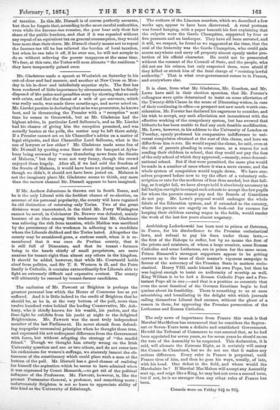The exclusion of Mr. Fawcett at Brighton is perhaps the
greatest personal loss which the House of Commons has as yet suffered. And it is little indeed to the credit of Brighton that he should be, as he is, at the very bottom of the poll, more than twelve hundred votes behind the leading Conservative, Mr. Ash- bury, who is chiefly known for his wealth, his yachts, and the lime-light he exhibits from his yacht at night to the delighted Brightonians. Mr. Fawcett was the most truly independent member of the last Parliament. He never shrank from defend- ing unpopular economical principles when he thought them true, and expressed his not unfrequent difference from the Government with force, but without adopting the strategy of "the candid friend." Though we thought him utterly wrong on the Irish University question and one or two others, and do not enter into his enthusiasm for women's suffrage, we sincerely lament the ob- tuseness of the constituency which could place such a man at the bottom of the poll. Mr. Disraeli has a good chance of realising for himself the aspiration which he seems to have admired when it was expressed by Count Bismarck,—to get rid of the political influence of the Professors. Mr. Fawcett, however, is, like the present Postmaster-General, a professor, and something more ; unfortunately Brighton is not so keen to appreciate ability of this kind as the University of Edinburgh.


































 Previous page
Previous page